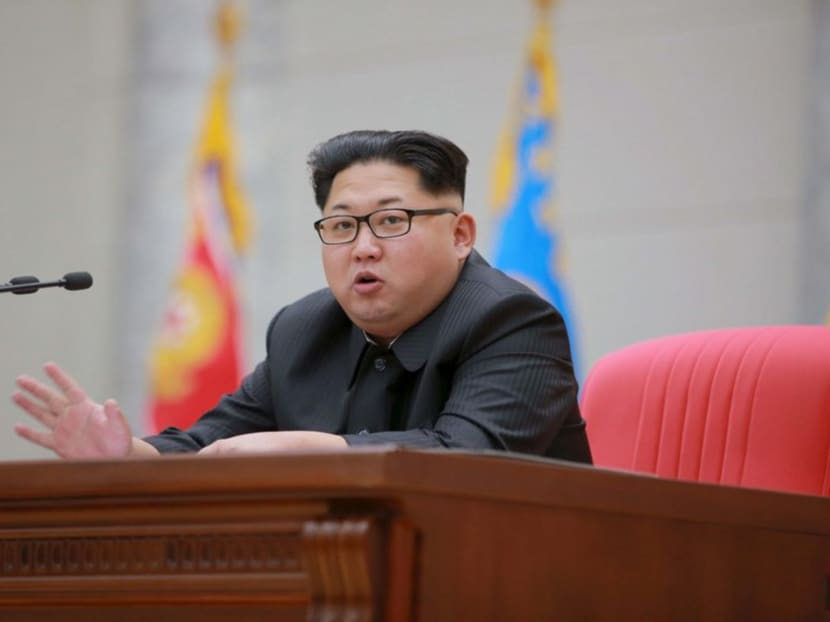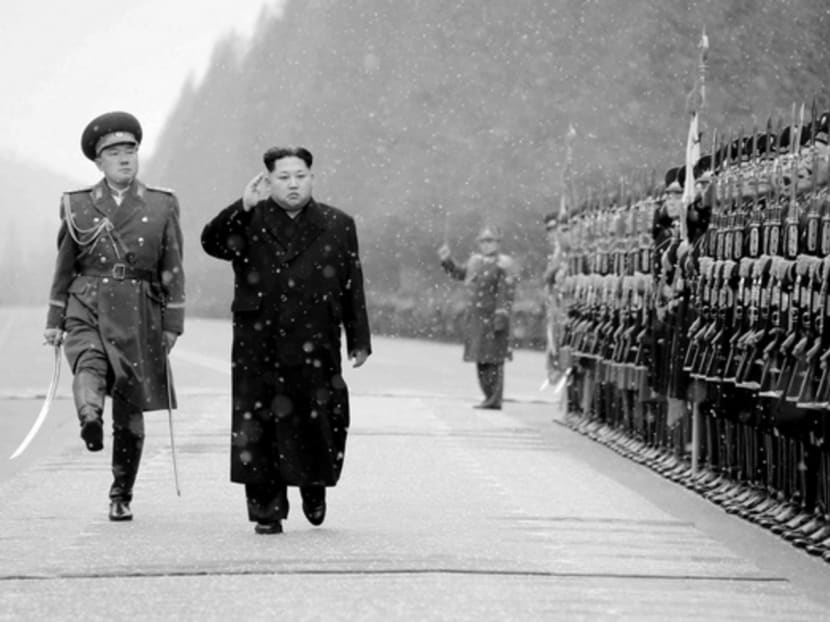Nuclear weapons critical to North Korean regime’s survival
North Korea leader Kim Jong-un sees the development of nuclear weapons as a way to shore up his domestic support and cannot accept any objection to such a policy by its neighbour and traditional ally China, says Professor Jia Qingguo, Dean of the School of Inter-national Studies at Peking University.


North Korea leader Kim Jong-un sees the development of nuclear weapons as a way to shore up his domestic support and cannot accept any objection to such a policy by its neighbour and traditional ally China, says Professor Jia Qingguo, Dean of the School of Inter-national Studies at Peking University.
In the second of a two-part interview with TODAY’s Albert Wai (albertwai [at] mediacorp.com.sg) on the sidelines of this week’s Regional Outlook Forum 2016 organised by the ISEAS-Yusof Ishak Institute, Prof Jia — a member of the Standing Committee and the Foreign Affairs Committee of the National Committee of the Chinese People’s Political Consultative Conference — shares his thoughts on cross-strait relations with Taiwan, the situation in the Korean peninsula, the recent market turmoil in the world’s No 2 economy, and China-United States relations.
In Taiwan, by all indications, frontrunner Tsai Ing-wen (of the pro-independence Democratic Progressive Party, or DPP) looks like she will win Saturday’s presidential election. What are the options for China?
Well, China does not have much option in terms of deciding which candidate is going to win in the election. However, China does have an option in terms of how to shape future Mainland-Taiwan relations. China hopes the DPP leader, if she gets elected, will not challenge the One-China principle —(based on) the 1992 consensus. Tsai Ing-wen doesn’t have much option in this regard. The Chinese government would probably not be bothered if she comes up with different internal policies to address various kinds of socio-economic challenges. But China does care about the One-China principle, or the 1992 consensus. Given the fact that Taiwan’s economy is so much dependent on the mainland, and also the relative defence capabilities across the Taiwan Strait ... it is hard to conceive that she would take some radical alternatives. People generally assume that she will try to come up with some different terms which are similar to the 1992 consensus so that the cross-strait relations can be stable. If Tsai Ing-wen has any personal ambition to reform Taiwanese social and economic policies, the Chinese government will probably be happy to see them.
Moving on to North Korea, there have been some strong words between Washington and Beijing on how to deal with Pyongyang. Given China’s very close ties with North Korea, will China try to reach out or has it reached a point where no one knows what can be predicted from the North anymore?
Well, the hydrogen bomb test, as North Korea calls it, was a surprise in a way, because, according to the Chinese government spokeswoman, the Chinese government was not informed before the test. But there were stories about how North Korea wanted to conduct another test right before, or weeks before, the actual test. North Korea has done another thing to hurt itself. This (latest test) would only generate more international sanctions against North Korea and further alienate China from North Korea.
I think China probably will work with the other five (countries) of the six-party talks (South Korea, North Korea, the United States, Japan and Russia) to put more pressure on North Korea in the days to come. Some people would say it’s a hopeless task to de-nuclearise North Korea. However, the international society has to impose more sanctions on North Korea, since developing nuclear weapons is against North Korea’s fundamental interests. It is hoped that sooner or later North Koreans would realise how bad a move in that direction it can be to develop nuclear weapons. In the meantime, the five countries probably should work even more closely to develop ideas as to how to persuade North Korea to give up nuclear weapons and also to develop contingency plans in the event of sudden crisis in North Korea.
I think, before this, some analysts were saying President Xi had tried to reach out to Kim Jong-un, and for a while it looked like there may have been some positive response. But suddenly, everything unravelled. What could be the reasons?
Kim Jong-un’s top priority is to maintain domestic support and stability. And he believes that the development of nuclear weapons is the only way to obtain that. In his logic, this (test) can make the North Korean people proud, and also make the North Korean regime more secure. He finds it difficult to accept China’s offers to improve relations because he knows that China would probably persuade him to give up nuclear weapons. He doesn’t want to face the reality that even the country which probably has given him the most support, and (with which Pyongyang) has the closest ties, does not agree with him on this nuclear issue and will put pressure on him. It seems to me (that the) North Korean government is quite unstable. It needs nuclear weapons to boost domestic support.
On the topic of domestic support, will Mr Xi’s political legitimacy be affected by the recent turmoil in the stock markets?
How to restore confidence in economic growth certainly is a big challenge for the Chinese government and it has been working very hard on it. (The) Chinese economy has been growing at a very rapid pace for the past 30 odd years. It has reached a certain point where the previous level of economic growth cannot be sustained. But (there are many reasons behind the) sharp decline in terms of confidence. I’m not sure which reasons are more important than others, but I think there are economic reasons, such as you cannot grow forever (and) that the world economy is still very fragile. There are also managerial problems in China like the decision to introduce the circuit breakers and the sudden suspended trading days. So, certainly, the Chinese government’s (economic) management team should also reflect. I think the general approach of the Chinese government to revitalise the economy is very constructive and promising. The problem is with implementation.
One of the problems that China faces now is how to sort out the rules; to make the rules more reasonable so that people can do things without violating the rules. Last year, Premier Li Keqiang talked about (how) 300 billion yuan (S$65.4 billion) was not spent by the local governments. This is quite different from previous years. In previous years, the local governments would demand for more money. If you don’t spend the money, you don’t have gross domestic product growth. There must be some reason for it. One of the causes is that there are many rules that are in conflict with one another, making it difficult to do things without violating some aspect of the rules. Nobody wants to violate the rules now, and that means no action. I think it’s important for the Chinese government to sort out the rules so that people can spend the money without violating the rules. So this is a big challenge, I think.
It is not good news if the economic growth goes down by too much. People will accept a certain level of slowdown in economic growth. They accept that China’s economy is getting into this new normal. But then, if the new normal means a sharp decline in economic growth, then probably people will not take it in a positive way.
What will the China-US relationship look like this year, given it is election season in Washington?
You will hear a lot of anti-China rhetoric as well as anti US-China policy rhetoric. Mostly the opposition party candidates will say the ruling party’s candidate — the Barack Obama administration (by extension) — is too soft on China. I think the Chinese government has been used to this. So probably, it will take a calm position, calm attitude, and not react too strongly to such kinds of criticism. And of course the Chinese government probably will continue to work more closely with the Obama administration to continue cooperation between the two countries ... (on issues such as) climate change, cyber security and the North Korean nuclear crisis.
I think the two governments really want to maintain a certain level of stability and cooperation because they believe this is where the common interests lie. They need to cooperate rather than confront each other.






